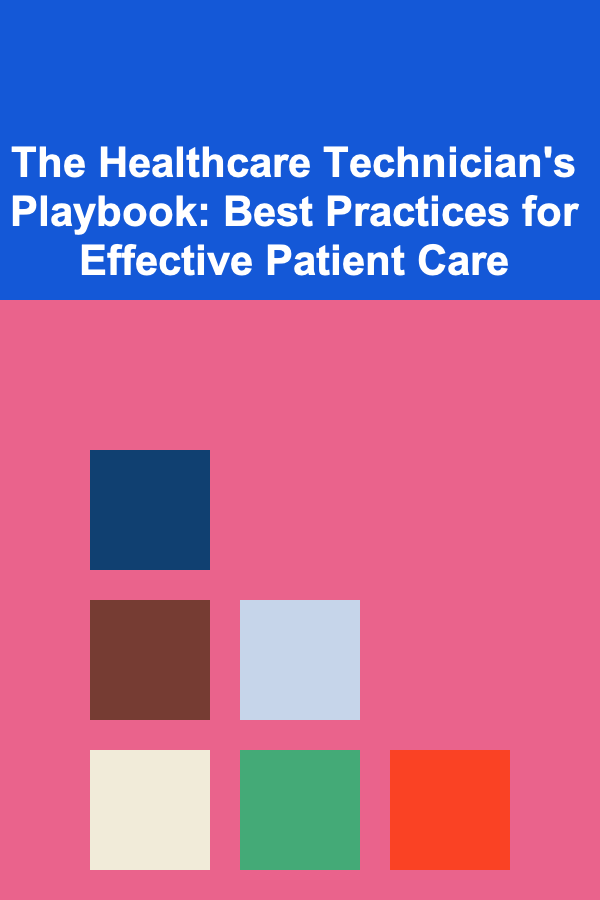
The Healthcare Technician's Playbook: Best Practices for Effective Patient Care
ebook include PDF & Audio bundle (Micro Guide)
$12.99$7.99
Limited Time Offer! Order within the next:

Healthcare technicians play a critical role in the healthcare ecosystem, bridging the gap between patients, doctors, and medical equipment. Whether working in laboratories, hospitals, diagnostic centers, or clinics, healthcare technicians are responsible for a wide range of tasks that directly impact the quality of patient care. This playbook explores best practices for healthcare technicians to ensure that they provide optimal care while maintaining safety, efficiency, and compassion.
Mastering Technical Skills and Knowledge
As the backbone of the healthcare system, healthcare technicians must have an in-depth understanding of the tools, equipment, and technologies they operate. Mastery of technical skills ensures that healthcare technicians can perform their duties with precision and confidence. Here are a few best practices in this area:
1.1 Stay Updated with Advances in Technology
The healthcare industry is constantly evolving, with new technologies emerging to improve patient outcomes. For instance, the introduction of advanced diagnostic equipment such as MRI machines, ultrasound devices, and robotic surgery tools has revolutionized the field.
- Continuous Learning: Healthcare technicians should regularly attend training programs, webinars, and workshops to stay current with the latest technologies in their field. This could include learning how to use updated software, new diagnostic tools, or novel patient monitoring devices.
- Certifications: Obtaining certifications in specialized areas, such as radiology, laboratory technology, or respiratory care, not only bolsters technical proficiency but also increases employability. Technicians should always pursue opportunities to expand their credentials through accredited courses.
1.2 Attention to Detail in Equipment Use
Healthcare technicians frequently operate highly sensitive medical equipment. The accuracy and reliability of these tools directly affect diagnostic accuracy and patient safety. Here's how to maintain high standards in equipment operation:
- Regular Calibration: Proper calibration ensures that the equipment provides accurate readings. Technicians should follow the manufacturer's guidelines for calibrating tools and perform calibration checks before each use.
- Routine Maintenance: Regular maintenance of equipment is essential to prevent malfunction or failure during procedures. Technicians should follow maintenance schedules, check for wear and tear, and report any potential issues immediately.
- Equipment Troubleshooting: Technicians should be adept at diagnosing minor issues with equipment. Understanding the equipment's troubleshooting steps can prevent delays in patient care and ensure a smooth workflow.
Building Strong Communication Skills
Healthcare technicians often act as intermediaries between doctors, nurses, patients, and their families. Clear and effective communication is essential in providing excellent care. Best practices include:
2.1 Communicating Effectively with Patients
Although healthcare technicians may not always have the same level of interaction with patients as doctors or nurses, they still play an important role in ensuring patients feel comfortable and informed.
- Introduce Yourself: Before starting any procedure, healthcare technicians should introduce themselves to the patient, explaining their role and what the patient can expect during the procedure. This helps build trust and reduce anxiety.
- Active Listening: Pay close attention to any questions or concerns the patient may have. Active listening ensures that the technician addresses the patient's needs and makes them feel heard and valued.
- Provide Clear Instructions: Explain any necessary steps or instructions to patients before performing tasks such as diagnostic tests, blood draws, or physical therapy. Offering clear, concise instructions helps patients understand what is happening and reduces confusion or stress.
2.2 Collaborating with Healthcare Team Members
Technicians are often part of a larger healthcare team. Effective communication between team members can lead to more coordinated care and better patient outcomes.
- Timely Reporting: Healthcare technicians should promptly report any issues or abnormalities they observe while performing procedures. This could include reporting abnormal vital signs, equipment malfunctions, or changes in a patient's condition.
- Use of Standardized Terminology: Healthcare technicians should adopt standardized medical language and terminology to avoid confusion and ensure that all members of the team understand the information being shared.
- Patient Handovers: When transitioning patient care, technicians must provide clear and concise handovers to the next care provider. Whether passing on information about equipment settings, patient preferences, or any issues encountered, thorough handovers prevent errors.
Upholding Patient Safety and Quality Care
Patient safety is the top priority in any healthcare setting, and healthcare technicians have a direct role in safeguarding this. Here's how technicians can contribute to ensuring the highest standards of care:
3.1 Infection Control Practices
Healthcare technicians work in environments where infection control is paramount. They must adhere to stringent infection control guidelines to prevent the spread of pathogens.
- Hand Hygiene: Consistently practicing proper hand hygiene is one of the most effective ways to reduce the transmission of infections. Technicians should wash hands before and after interacting with patients and medical equipment.
- Use of Personal Protective Equipment (PPE): PPE, such as gloves, masks, gowns, and face shields, should always be worn when required. Technicians must be trained in proper PPE usage to minimize the risk of contamination and protect both themselves and patients.
- Cleaning and Disinfection: All medical equipment and surfaces should be cleaned and disinfected regularly to prevent the spread of infections. Healthcare technicians must follow hospital protocols for cleaning, ensuring that equipment is sterile and safe for use.
3.2 Adhering to Patient Confidentiality
In addition to maintaining safety, healthcare technicians must also protect patient privacy and confidentiality. HIPAA (Health Insurance Portability and Accountability Act) regulations in the U.S. require all healthcare workers, including technicians, to uphold these principles.
- Limit Access to Patient Information: Technicians should access only the patient information required to perform their job. Sharing patient information without consent is a serious violation of privacy and can result in legal consequences.
- Secure Handling of Medical Records: Patient records, both electronic and paper, should be securely stored and only shared with authorized individuals. Healthcare technicians must follow proper protocols when handling sensitive medical data.
3.3 Identifying and Reporting Adverse Events
Adverse events, such as medical errors, equipment failures, or patient harm, can occur in healthcare settings. Timely identification and reporting of these events are crucial in improving patient care and preventing future incidents.
- Incident Reporting: Healthcare technicians should be trained to report any adverse events in a timely manner. Reporting is often done through internal systems, and technicians should provide as much detail as possible to aid in investigations.
- Root Cause Analysis: When incidents occur, technicians should participate in root cause analysis processes to identify underlying issues and recommend improvements to procedures or equipment. This proactive approach helps prevent recurrence.
Cultivating Compassion and Empathy
While technical skills are essential, healthcare technicians must also demonstrate compassion and empathy in their interactions with patients. A kind and understanding approach can have a significant impact on a patient's emotional well-being.
4.1 Acknowledging Patient Emotions
Patients may be anxious, scared, or in pain when receiving medical care. Healthcare technicians should acknowledge these emotions and respond in a compassionate manner.
- Empathetic Responses: If a patient expresses fear or discomfort, healthcare technicians should respond with empathy. Simple phrases like, "I understand this may be difficult, but I'm here to help" can provide comfort and build trust.
- Non-Verbal Cues: Non-verbal communication, such as maintaining eye contact, offering a reassuring smile, and using a gentle tone of voice, can help patients feel more at ease.
4.2 Creating a Positive Patient Experience
The technician's role in patient care often extends beyond the technical aspects to include enhancing the overall patient experience. A positive experience can contribute to better health outcomes and patient satisfaction.
- Be Attentive: Pay attention to a patient's comfort during procedures. Adjusting a patient's position, explaining each step, or offering reassurance can make a significant difference in their experience.
- Provide Emotional Support: Sometimes, patients may need emotional support in addition to physical care. Offering a listening ear or a kind word can help ease their anxieties and make them feel cared for.
Conclusion
Healthcare technicians are integral to the success of healthcare delivery. Their ability to operate medical equipment, maintain patient safety, communicate effectively, and show compassion can have a profound impact on patient outcomes. By adhering to the best practices outlined in this playbook, healthcare technicians can ensure they provide exceptional care while maintaining professional standards and continuously improving their skills. Their role in the healthcare system is indispensable, and by following these guidelines, they can continue to make a positive difference in the lives of those they serve.

10 Effective Tips for Saving on Home Energy Bills Year-Round
Read More
How to Cut Down on Home Entertainment Costs
Read More
How to Get Rid of Unwanted Odors in Your Home
Read More
How to Invest in Real Estate with Little to No Money Down
Read More
How to Safeguard Your Home Against Natural Disasters with Security Measures
Read More
How to Set Up a Home Budget for Digital Subscriptions and Services
Read MoreOther Products

10 Effective Tips for Saving on Home Energy Bills Year-Round
Read More
How to Cut Down on Home Entertainment Costs
Read More
How to Get Rid of Unwanted Odors in Your Home
Read More
How to Invest in Real Estate with Little to No Money Down
Read More
How to Safeguard Your Home Against Natural Disasters with Security Measures
Read More